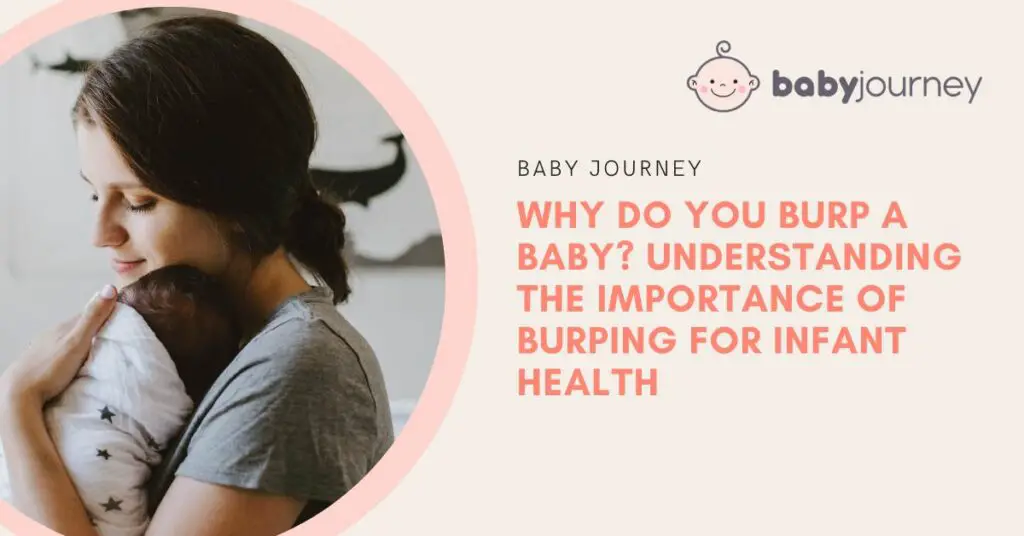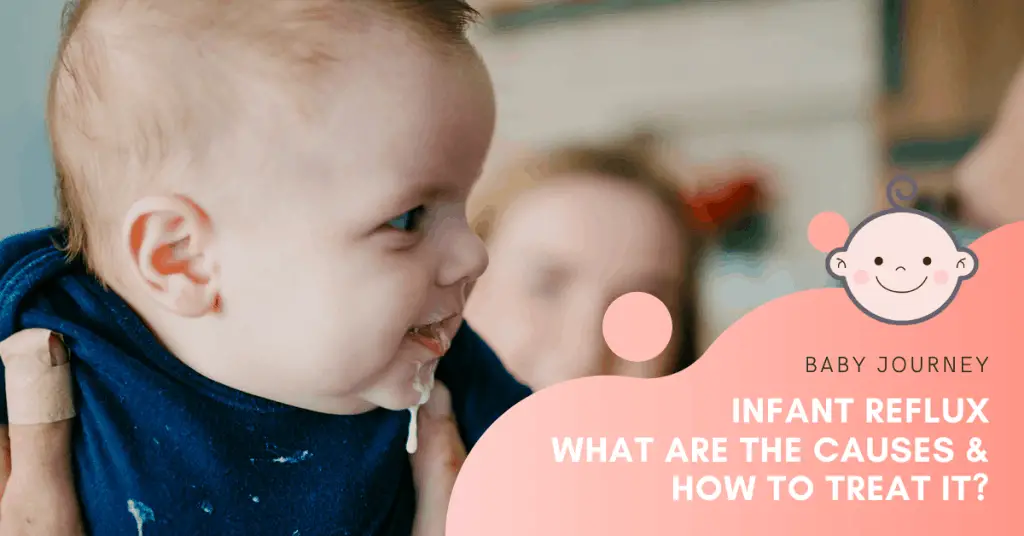Why do you burp a baby? Burping a baby is a common practice that many parents perform after feeding their little ones. Babies tend to swallow air while feeding, which can cause discomfort and fussiness. Burping helps to release the trapped air, making the baby feel more comfortable and content.
There are different ways to burp a baby, and some babies may require more frequent burping than others. While some may need to be burped during their feed, others may require it after. Parents can try different techniques to find what works best for their baby. It is essential to burp the baby regularly to prevent baby spits up, crankiness, and gassiness.
Why Do Babies Need to Be Burped?
Why do you have to burp babies? Babies need to burp because they tend to swallow air when they eat. This air can get trapped in their digestive system and cause discomfort, fussiness, and even spit-up or vomiting. Burping helps release these air bubbles up the esophagus and out of the mouth, which can relieve gas and reduce the likelihood of these symptoms.
Why Is It Important To Burp A Baby?
Why do you have to burp a baby? Burping is important because it can prevent discomfort and other issues caused by trapped air in a baby’s digestive system. When a baby swallows air while feeding, it can cause gassiness, bloating, and discomfort. In some cases, it can even lead to colic or crankiness. Burping helps to release this trapped air, which can ease these symptoms and make the baby more comfortable.
Why do we burp babies? Burping is especially important for breastfed babies, who may swallow more air while nursing. It is also important for bottle-fed babies, as they can also swallow air while feeding from a bottle. Burping can help prevent spit-up and vomiting, which can be uncomfortable and messy for both baby and caregiver.
There are different techniques and positions for burping a baby, and caregivers may need to try a few to find what works best for their baby. Some common positions for burping include over the shoulder, sitting on your lap, or lying across your lap. It can also be helpful to use a burp cloth or towel to catch any spit-up that may come up with the burp.
Why do you need to burp a baby? Pediatricians recommend burping a baby after each feeding, and sometimes even in between feedings if the baby seems uncomfortable or squirmy. Signs that a baby may need to burp include fussiness, crying, or discomfort, especially after a feeding. It is important to burp a baby gently and patiently, using techniques such as patting or massaging their back to help release trapped air.
In summary, burping is an important part of a baby’s feeding routine that can help prevent discomfort, spit-up, and vomiting. Caregivers should try different positions and techniques to find what works best for their baby, and should be patient and gentle when burping. If a baby continues to have gas pains or other digestive issues, it may be helpful to speak with a pediatrician about other potential solutions, such as changing the baby’s diet or trying gripe water.
The Science Behind Baby Burps
Babies tend to swallow air when they eat, which can give them gas. According to a study, babies can swallow up to 1.5 ounces of air during a feeding. This can happen because of a variety of reasons, including:
- Using a bottle with a nipple that releases too much milk or formula too quickly
- Using a bottle with a nipple that is too small or too large
- Improper latching during breastfeeding
- Crying or fussing during or after feeding
Why Do Babies Have To Be Burped?
Why do babies burp? Burping can help relieve gas, which some people believe makes the baby feel better. It can also prevent the baby spits up or vomiting. Burping helps release the air that was swallowed during feeding, which can help prevent discomfort, fussiness, and colic.
However, not all babies need to burp after every feeding. Some babies are able to release the air on their own, while others may not have swallowed enough air to require burping. It is important to pay attention to the baby’s behavior and cues to determine if they need to be burped.
What Happens If a Baby Doesn’t Burp?
Why do babies need to burp? If a baby doesn’t burp after feeding, it doesn’t necessarily mean that they will experience discomfort or other issues. However, if the baby has swallowed a large amount of air, they may experience discomfort, bloating, and gas. This can lead to fussiness, crying, and difficulty sleeping.
In rare cases, a baby may develop colic, which is characterized by excessive crying and fussiness. While the cause of colic is not fully understood, it is believed to be related to digestive issues, including gas and bloating.
Overall, burping a baby can help prevent discomfort and promote better digestion. However, not all babies need to be burped after every feeding, and it is important to pay attention to the baby’s cues to determine if they need to be burped.
How to Burp Your Baby
Why do you burp babies? Burping is an essential part of a baby’s feeding routine, as it helps release air bubbles that may have been swallowed during the feeding process. Here are some techniques and tips on how to burp your baby:
Different Positions for Burping
There are several positions you can try to help your baby burp:
- Over the shoulder: Gently stroke your baby’s back while supporting them upright with their chin above your shoulder.
- Sitting on your lap: Place the baby on your lap, one hand holding the baby’s head and chest and the other softly patting their back.
- Lying across your lap: Lie your baby face down across your lap and gently give them a rub on their back.
- Walking: Hold your baby upright against your chest and walk around while gently patting their back.
Techniques for Burping Your Baby
There are different techniques you can use to help your baby burp:
- Patting: Use a gentle patting motion on your baby’s back to help release the trapped air.
- Massaging: Gently massage your baby’s back or tummy in a circular motion to help move the air bubbles along their digestive system.
- Swaddling: Swaddle your baby snugly and hold them in an upright position while patting or rubbing their back.
- Using a burp cloth or bib: Place a burp cloth or bib over your shoulder or on your lap to wipe off the unwanted spit-up or vomit.
Tips for Burping Your Baby
Here are some tips to keep in mind when burping your baby:
- Try different positions and techniques to find what works best for your baby.
- Burp your baby frequently during feedings, especially if they are bottle-fed or have gastroesophageal reflux disease (GERD).
- Watch for signs of discomfort, such as fussiness, crying, or arching of the back, which may indicate the need for burping.
- Whenever a baby falls asleep during a feeding, keep trying to burp them prior to putting them to bed.
- If your baby is squirmy or cranky during a feeding, take a break and try burping them before continuing.
- If you are breastfeeding, try switching breasts if your baby seems gassy or has gas pains.
- If your baby is colicky or has excessive gas, talk to your pediatrician about possible dietary changes or the use of gripe water.
- If your baby has an allergic reaction to breast milk or formula, they may have excessive gas or spit-up.
- Be patient and gentle when burping your baby, and always support the baby’s head and neck.
In summary, burping your baby is an important part of their feeding routine, as it helps release trapped air and can prevent discomfort and spit-up. Try different positions and techniques to find what works best for your baby, and always be patient and gentle when burping them.
When to Talk to Your Pediatrician
Signs of Discomfort
If a baby is experiencing discomfort due to gas, it is important to watch for signs of distress. Some common signs of discomfort include crying, fussiness, and squirming. Babies may also arch their backs or pull their legs up to their tummy. If a baby is bottle-fed, they may refuse to eat or take only small amounts of milk. Breastfed babies may pull away from the breast or cry during feedings.
When to Call the Doctor
If a baby is experiencing severe discomfort or vomiting, it is important to contact a pediatrician. In some cases, gastroesophageal reflux disease (GERD) may be the cause of the discomfort. A doctor may suggest different feeding positions or techniques to help a baby burp and reduce the amount of air they swallow during feedings.
If a baby is consistently fussy and uncomfortable, it may be a sign of colic or gas pains. In these cases, a pediatrician may recommend changes to the baby’s diet or suggest gripe water to help relieve symptoms.
If a baby is experiencing discomfort due to gas, it is important to try different positions for burping. Some effective positions include holding the baby over the shoulder, sitting on your lap, or lying the baby across your lap. It may also be helpful to use a burp cloth or towel to protect clothing during feedings. Swaddling and massaging the baby’s tummy can also help to relieve trapped air.
Overall, it is important to talk to a pediatrician if a baby is experiencing severe discomfort or if parents have concerns about their baby’s feeding routine. A doctor can provide guidance on how to burp a baby and offer tips on how to reduce gas and spitting up.
Conclusion
In conclusion, burping a baby is an essential part of their feeding routine. It helps to get rid of the air that babies tend to swallow during feeding. Burping can help relieve gas, which some people believe makes the baby feel better.
There are different techniques and positions to burp a baby, and parents can choose the one that works best for them and their baby. Some common positions include holding the baby over the shoulder, sitting them upright on the lap, or laying them face down on the lap.
It is important to burp a baby frequently during feeding, especially if they are bottle-fed or if they tend to swallow a lot of air while breastfeeding. Not burping a baby frequently enough or not getting rid of trapped gas can lead to spitting up, crankiness, and a feeling of gassiness.
Parents should also be aware of the signs of trapped gas in their baby, such as fussiness, squirming, and pulling their legs up to their tummy. If a baby seems uncomfortable or in pain, parents should try to burp them to help relieve the gas.
Overall, burping a baby is a simple and effective way to help them feel more comfortable during and after feeding. By following the tips and techniques outlined in this article, parents can ensure that their baby is getting the best care possible.



